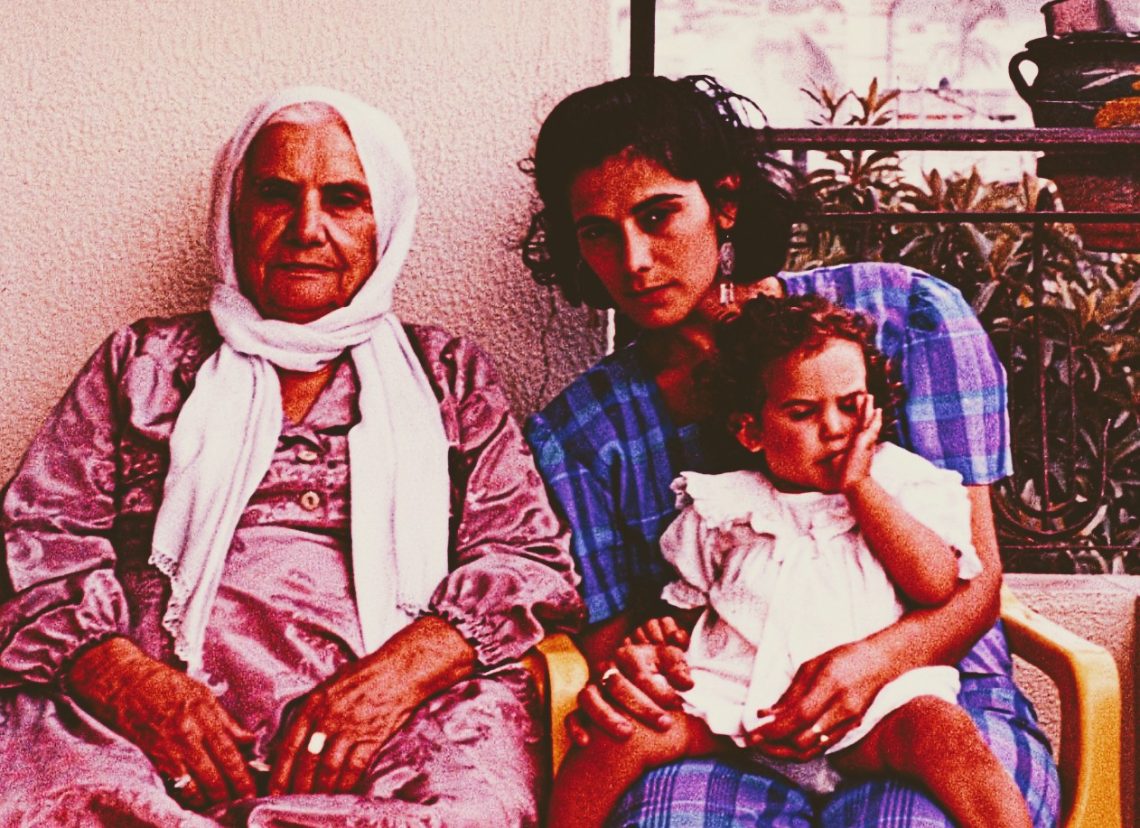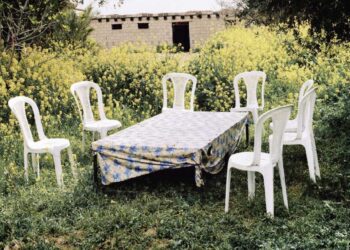After her first film, “Their Algeria,” a journey diving into the stories of Algerians in France, as well as her Algerian roots and how the colonial past left its effects on their lives, the actress and director Lina Soualem returns with her second feature-length documentary, “Bye-Bye Tiberias.”
She takes the viewers on a transcendent historical journey, exploring her Palestinian family’s past, which was always a mystery to her. Through the narrative of four generations of women in her family, the film unfolds the complete Palestinian story.
Through a dense, divergent narrative, and elegant film editing, Lina begins with the recitation of a poem by her mother, the actress Hiam Abbas, written when she was in her prime. Accompanied by the music composed by Amin Bouhafa, Lina, along with her screenwriters Nadine Naous and Gladys Joujou (who also worked on the film’s editing), moves between the public and the personal and her family history, placing it in the context of the collective history of the Palestinian people. The film navigates through archival scenes depicting Tiberias during the Nakba, narrating the history of her maternal grandfather’s family displacement. It also captures another Tiberias, transformed by Israel, during a journey with her mother Hiam, and grandmother Naamat.
Intending to visually capture the family’s past, the director turned to stunning archival footage that was scattered and challenging to obtain. Over six years dedicated to filmmaking, she diligently collected these materials, including segments from her father’s video archive, the actor Azzeddine Suleiman. These clips were captured during his visit with her mother Hiam to the family home in Deir Hanna. Later, Lina worked to integrate them seamlessly with her own recorded visuals, creating a cohesive visual piece.
Lina and her work partners place the audience on an emotional seesaw, guiding them through a spectrum of feelings—from the utmost empathy and enjoyment of intimate family moments to the deepest sorrow concerning their personal and collective destinies.
Lina’s mother, Hiam Abbas, her mother Naamat, and her grandmother Um Ali, didn’t want to open the wounds of the past and the circumstances of their departure from their village, Deir Hanna, to Lake Tiberias, and eventually to Paris. However, when they finally accepted Lina’s invitation, a flood of sorrows from the displacement experienced by the generation of mothers and grandmothers from Tiberias poured forth. Laughter was exchanged in videos recorded during Lina’s visits to Deir Hanna and during delightful conversations about the past, registered for the documentary. Her sisters share how Hiam was “the rebel of the family, forming a new relationship with a different young man every day.”
While Lina has tried to reassure her mother, ensuring the film doesn’t turn into a portrait solely of her, Hiam Abbas remains a key figure in the film. She reconstructs the family’s history, delving into Hiam’s “rebellion” against her family and her decision to leave Palestine for France, eventually becoming a well-known actress in Europe and Hollywood. The film explores how she managed to mend her relationship with her family. As the narrative transitions, Lina discusses the broader family picture, diving into the stories of her mother’s grandmother and aunt separated by the Nakba and the subsequent traumas they dealt with over decades.
Despite Hiam’s familiarity with standing in front of the camera, boasting around a hundred film and television works (her latest role in the series “Succession”), the actress faces a different experience in this film. She doesn’t summon the emotions of other characters from a written script but rather delves into feelings connected to her experiences over the past decades. The film captures personal moments in her life as she attempts to reclaim them, such as her performance in a scene with a Palestinian actor playing the role of her father opposing her first marriage to a British man, staged at the Palestinian National Theatre in Jerusalem.
The film is presented at a time when the propaganda war is grinding away the humanity of the Palestinian people. This was evident in a question posed by the Italian channel “Rai Uno” to the film’s director, Lina, after the screening. The question concerned whether the Palestinian family has a “sense of family.” Lina responded, stating that as Palestinians, they must struggle every day to prove their humanity.
Lina doesn’t depict a politicized family story in the film. Nevertheless, within the narrative context, she illustrates how any Palestinian family can only consider “politics” as a deeply personal matter.
The actress and director, with her calm and poetic narration, doesn’t fall into the trap of direct discourse. The discussion of the Nakba and Israel’s displacement of 700,000 Palestinians becomes an integral part of the story. The film’s title, with which the family’s tragedies commence, addresses how each individual in the family dealt with its consequences for subsequent generations when borders severed their connections.
After Hiam’s grandfather passed away, due to the hardships of the Nakba, Um Ali, the grandmother, struggled to raise her large family. Following her, Neamat, Hiam’s mother, managed to work as a teacher despite raising ten children. Their stories depict a transgenerational struggle of women who learned to start anew and leave everything behind. Hiam recalls how her aunt Hassaneh, stranded in Syria for decades after their displacement in 1948, miraculously returned to Tiberias after thirty years. In an emotional meeting with her mother and aunt, they embraced each other like magnetic pieces for hours. She later remembers the visit paid to her aunt in the Yarmouk camp in Damascus as a French citizen, considering her ability to reach Syria a triumph. She describes their emotional reunion: her aunt spent hours inhaling her scent, and she informed the camp residents that her guest was coming from Palestine, carrying the fragrance of home with her.
The film was showcased at prominent documentary film festivals worldwide, such as Dok Leipzig and IDFA, as well as at the Toronto and Venice festivals. It won the Grierson Award for Documentary Films at the London Film Festival. The Palestinian Cinema Foundation selected it to represent them in the Oscar race, although it didn’t make it to the final competition.
The film continues to participate in festivals and is now available for viewing on the German-French network “ARTE,” which collaborated in the film’s production, until mid-February through the link here.








